As Hard-Liners Rise, Shadowy Revolutionary Guard Muscles In on Airport And Nabs Energy Deals; Dawn Clash Over a Drilling Rig in The Persian Gulf
First published: october 14, 2006; The Wall Street Journal (link to Iranfocus.com).
by Andrew Higgins
In addition, another example about recent involvement from the Revolutionary Guards in Iran’s economy and how the Supreme Leader Ali Khamenei abuses his political power to extract and accumulate his private enrichment (using politically means to maintain his hold on power while oppressing the Reformist movement at the same time) and increasing his wealth for personal use only. You can read the story about the Supreme Leader, Ali Khamenei, also below.
Early one morning in August, a pair of Iranian military vessels pulled up alongside the Orizont, a Romanian oil rig working in waters off the coast of Iran. Armed men jumped out and clambered up one leg of the drilling platform.
Viorel Petcu, the rig’s chief, phoned his boss in Romania to report that the Iranians had started shooting. The line then went dead as the Iranians commandeered the communications room and herded 19 Romanian workers onto the helicopter pad. No one was hurt, recalled Mr. Petcu, speaking later from the still-occupied rig, but “it was like something you only see only on television.” Iran denies opening fire.
The rig matter ostensibly was just a lease dispute between partners. But it exposed the potent political forces that roil Iranian business, including the heavy hand of elements close to Iran’s hard-line president. Prominent among those forces in business today is a group the West knows mainly for its fervor in enforcing religious rectitude: the Islamic Revolutionary Guard Corps.
The secretive paramilitary group, according to the U.S., arms both violent Shiite militias in Iraq and Hezbollah, the Lebanese group that fought a war with Israel this summer. It runs feared prisons inside Iran. The Revolutionary Guard also has a big role that is less understood in the West: an active player in business.
It builds highways and tunnels. Two years ago it muscled aside a Turkish firm that had a contract to run a new Tehran airport. Now the Revolutionary Guard is making an aggressive push into the backbone of Iran’s economy, its oil and gas fields, one of the world’s richest troves of fossil fuel.
In June, a Revolutionary Guard engineering group won a $2.3 billion contract to develop part of a big gas field in Iran’s part of the Persian Gulf. That group also won a $1.3 billion deal to build a pipeline across Iran toward Pakistan.
Who exactly ordered the raid on the Romanian drilling rig isn’t clear. Iran’s government says it was carried out by the police. Romanians still aboard the rig — now lying paralyzed in the Gulf — say one of the five Iranians currently occupying and controlling it is a Revolutionary Guard officer. In any case, the Guard now is among those negotiating to take over an Iranian firm, Oriental Oil Co., that holds the lease to this rig and two other disputed platforms from Romania.
The struggle for the leases and drilling rigs reveals an unintended consequence of U.S. foreign policy. In this case, instead of weakening Iran, America’s efforts to squeeze the country ended up boosting the very hard-line forces there that the U.S. wants to curb.
Washington urged European banks not to do business with Iranian banks. But when one of them stopped doing so, it put Oriental Oil, the holder of the rig lease, in a bind. This and other problems prompted Oriental to put itself up for sale, creating an opening for Iranian hard-liners to try to grab the business.
The Revolutionary Guard has long been a major force in Iran’s politics. It has its own ground, air and naval units, which operate in parallel to Iran’s regular military. Former guardsmen — including President Mahmoud Ahmadinejad — are scattered throughout the government and security apparatus. While some Guard veterans have become reformers, the organization has a fearsome reputation inside Iran as a brutal defender of revolutionary orthodoxy.
It runs its own intelligence service and has played a big role in crushing dissent, most recently in 1999 during a wave of student-led protests. The Guard also controls a feared outfit called the Basij, composed of youthful zealots who prowl the streets hunting for insufficiently veiled women and others who violate strict Islamic norms. The Basij claims millions of members.
The Guard has a long history of activity abroad, having helped set up Lebanon’s Hezbollah militia in the early 1980s. More recently it has reached into neighboring Iraq. There, according to a senior Israeli security official, its quest for influence is spearheaded by a special unit of the Guard called the Ramadan Headquarters, which trains and funds Iraq Shiite fighters.
The Guard’s business activities include engineering, media, trading and energy. “They are taking positions everywhere,” says Mohsen Sazegara, a former aide to the late Ayatollah Khomeini and a founder of the paramilitary force in 1979. The Guard, says Mr. Sazegara, who broke with Iran’s regime a few years ago and now lives in the U.S., is a “unique organization in the world: a political body, a military force and big, complex company.”
The Guard got its start in business after Iran’s 1980-88 war with Saddam Hussein’s Iraq, in which it fought and suffered horrendous losses. Its engineering unit, called Khatam al-Anbiya Construction Headquarters, then shifted from building fortifications to projects such as roads, dams and tunnels. (The unit’s name derives from a phrase meaning “the final prophet,” i.e., the Prophet Mohammed.) Presenting itself as an ordinary company, Khatam set up a Web site and published an in-house journal called Road and Tunnel Magazine. It established headquarters in a nondescript building in northern Tehran. Its chief is a former oil engineer.
Throughout, though, Khatam has remained an essentially military operation. “I’m not allowed to tell you anything,” says Mohammadreza Rajabalinejad, a civil engineer who used to edit its magazine. A senior Guard official recently told the Iranian press 70% of Khatam’s work is military-related. Khatam declined to comment.
The Guard’s initial reason for getting into business was both economic and political: newly demobilized and often bitter soldiers needed jobs, and the government, fearful of unrest, wanted to keep them occupied. As Khatam and other Guard ventures grew, they helped generate funds for the Guard and allowed regime loyalists to enrich themselves free from scrutiny by parliament or other state bodies.
The Guard reports not to the government but to Iran’s supreme authority, the cleric Ayatollah Ali Khamenei. Its business units publish no accounts. Its budget is secret.
Though focused on work inside Iran, Khatam and other Guard ventures have done jobs abroad. They helped build a road in western Afghanistan after the fall of the Taliban, when the U.S.-backed government of Hamid Karzai pleaded for foreign help. Mr. Sazegara says the Guard is deeply involved in smuggling foreign goods into Iran.
The Guard made its first splashy display of hardball business tactics in May 2004. That month, it ousted a Turkish company that had a contract to run Iran’s new Imam Khomeini International Airport. Troops and armored cars crashed a grand opening, blocking the runway. A plane that was about to land was turned away and all further flights were canceled.
The Turks fled. “It was a horrible, fantastical day,” says Erken Ozber, a manager for the Turkish company, Tepe-Akfen-Vie. Months later, the airport reopened under management of the Revolutionary Guard and Iranian state organizations.
The debacle didn’t dim the enthusiasm of foreign companies scouting for prospects in Iran’s energy sector. Iran has the biggest natural-gas reserves after Russia and, according to the BP Statistical Review, its oil deposits are second only to Saudi Arabia’s.
Among those looking for prospects was a Norwegian company called Aker Kvaerner. It led a consortium in 2004 that, Iranian officials say, included Khatam, the Revolutionary Guard unit. In early 2005, the consortium won a deal to help develop Iran’s giant South Pars gas field in the Persian Gulf.
The Norwegians ran into flak at home for associating with the Guard, whose harsh prison network in Iran is notorious. “In Alliance with the Army of Torture,” read a headline in an Oslo paper. The company’s chief executive wrote a letter defending its Iran business. In any case, the deal soured before final terms could be worked out. The Norwegian company won’t specify what went wrong.
Oriental Oil, the company currently at the center of the rig affair, also wanted into the big gas field. One of its sister companies formed a bidding partnership with a unit of Halliburton Co. of Houston. Although Washington tightly restricts U.S. companies and citizens from doing business in Iran, the rules don’t bar non-U.S. citizens working for foreign-registered subsidiaries, as was the case with this Halliburton unit.
Oriental Oil, with offices in Dubai and Tehran, certainly looked like a good bet at the time, 2004. Its majority owner, Mehrdad Akbar Safdari, was a veteran of Iran’s war with Iraq. People who know him say he had close ties both to the Guard and to more moderate political forces then running Iran. Also well connected was a partner of his, Cyrus Nasseri, an urbane former Iranian ambassador to the United Nations in Geneva who had studied for a time in Kentucky and spoke both English and French. He had won the trust of Iran’s governing elite by helping negotiate the end of the Iran-Iraq war in 1988.
Oriental also got into the offshore-rig business. It rented foreign drilling rigs with the intent of re-leasing them, at a markup, to Iran’s national oil company.
Oriental leased two rigs, first from Romania’s state oil company and later from a private Romanian company that bought the rigs from the state company. The price, a fixed $40,000 a day, now is a bargain, because rates have since roughly tripled. The private Romanian company also then agreed to rent a third platform to Oriental.
To handle details, Oriental set up a letter of credit through an Iranian state-owned bank, Bank Saderat. Credit Suisse Group in Europe agreed to work with that bank to process the lease payments.
Things started to pay off for Oriental and Halliburton in late 2004. Oriental won a $307 million contract to develop two phases of the gas field. It was “a very happy time,” recalls Oriental’s general manager in Dubai, Khosrow Arabi.
But political winds in Tehran were shifting. Conservatives had just won parliamentary elections. Then in June of 2005, Iran elected as president Mr. Ahmadinejad, himself a former Revolutionary Guardsman. He had campaigned on a pledge to curb what he called Iran’s “oil mafia.”
As president, he moved against businesses close to his more moderate predecessor. News media linked to the Guard and other hard-liners began to denounce Oriental Oil, and particularly its minority owner, the diplomat Mr. Nasseri. Fars News Agency complained that Mr. Nasseri “had access to the country’s most secret information as a member of Iran’s nuclear negotiating team and at the same time was dealing directly with the American company Halliburton, which once was run by Dick Cheney.” Some griped about a since-aborted deal he had helped negotiate under which Iran agreed to suspend uranium enrichment. Asked about this, Mr. Nasseri says he won’t discuss “lies and rumor.”
In short order, Iran announced it was investigating Oriental Oil for corruption. The state oil company, alleging bribery, canceled Oriental Oil’s winning bid for work in the South Pars gas field.
At that point, Halliburton dropped all contact with Oriental. Halliburton says they had never signed a final contract. Mr. Arabi, Oriental’s manager in Dubai, recalls that “we were fighting with everyone. We had headaches everywhere.”
Oriental, however, still had something Iran needed: lease contracts for several foreign offshore drilling rigs, including the three Romanian ones.
A shortage of drilling rigs has long bedeviled Iran, hurting its efforts to increase oil production, which remains far below the level before the 1979 revolution. U.S. law keeps out American drillers, the biggest players in the business.
Stripped of its biggest projects, Oriental Oil now clung to the drilling rigs as a lifeline. Its grip quickly began to slip.
In February, Credit Suisse said it was suspending its role handling the lease payments in cooperation with Iran’s Bank Saderat. This followed U.S. pressure on big European banks to curtail business with the Iranian bank. A Credit Suisse spokesman declined to comment on the spat but said the bank was doing a “controlled withdrawal” from work with Iran-related corporate clients and decided late last year to refuse new Iran business. He cited an “increase in political and financial risks” and a desire to “safeguard our reputation.”
The U.S. Treasury Department, ramping up its campaign to squeeze Iran, last month announced it was excluding Bank Saderat from both direct and indirect access to the U.S. financial system. The Treasury claimed Iran had used the bank to funnel $50 million to a group controlled by Hezbollah.
In this case, the U.S. campaign, because of the squeeze it created for Oriental Oil, may have ended up helping what is believed to be Hezbollah’s principal sponsor — the Revolutionary Guard.
The Romanian owner of the drilling rigs, Grup Servicii Petroliere SA, said it couldn’t continue to lease the rigs to Oriental now that Credit Suisse had pulled out. Gabriel Comanescu, the Romanian company’s president, also complained about a heap of unpaid bills. In April, he terminated the lease contracts and demanded his rigs back. Oriental, saying it could find a replacement bank, made clear that it had no intention of giving up the rigs. The two sides’ claims and counterclaims are now before an arbitration panel in Paris.
Oriental, beset both by political problems at home and by banking woes abroad, decided its only option was to sell out, says its Mr. Arabi. “They are the winners,” he said, referring to hard-line Iranian politicians and news media who he said were behind the campaign against Oriental. Iran suddenly dropped its corruption case against the company.
The Revolutionary Guard, meanwhile, was on a roll. Iran’s new government had given it the lead role in developing two phases of the gas field — the same project previously assigned to the Norwegian-led consortium. The Guard also won a gas pipeline deal, plus a contract to expand Tehran’s subway system.
Its advances haven’t come without push-back, reflecting the rival power centers that mark Iran today. Reformist members of parliament wrote to President Ahmadinejad complaining about no-bid contracts and below-market-rate loans given to the Guard. And parliament blocked Mr. Ahmadinejad’s attempt to name a Guard veteran as oil minister.
Still, when Oriental Oil gave up and decided to sell itself, the Guard’s engineering unit quickly became a top contender to buy it, in competition with an affiliate of the state oil company and others.
The U.S. is deeply wary of the Revolutionary Guard but believes that the trials of Iranian firms squeezed by foreign banks may in the future undermine hard-line elements. “While those who are currently benefitting from Iranian integration into the global economy are the ones who will feel this isolation the most, they are also in the best position to persuade the regime that its current track will undermine the future of the Iranian people,” said Stuart Levey, Under Treasury Secretary for Terrorism and Financial Intelligence.
In Romania, Mr. Comanescu, having canceled the drilling-rig leases when the bank system for handling lease payments collapsed, laid plans to get the three rigs back. One was outside Iran for repairs, so reclaiming it wasn’t hard. But two were moored in Iranian waters in the Persian Gulf.
In June, Mr. Comanescu hired three tugboats to drag off one of them, the Orizont. But the tugs turned back after Iran’s state oil company ordered them to.
In August, he tried again, this time with the other rig, and had more success. Tugs towed it from Iranian waters to the United Arab Emirates. Iran branded the move a hijacking and said state oil officials had been roughed up and held hostage. Ian Bahn, a Briton who supervised the move, called that charge nonsense, saying the men allegedly held hostage were “smiling, laughing and joking with us.”
This left just one Romanian drilling rig, the Orizont, still in Iranian waters. An Iranian court ordered that it stay put.
On Aug. 22, vessels again approached the rig, but this time they weren’t tugboats. They were Iranian boats, and their occupants had guns, says the rig’s chief, Mr. Petcu. He says the Iranians forced their way aboard.
Mr. Petcu says that after the Iranian forces herded him and the other Romanians onto the helicopter pad, the intruders began hunting for documents, looking in computers, cabinets and even the refrigerator.
Photos taken by the Romanians show two Iranian vessels. There was a large patrol boat of the type Iran’s navy uses and a smaller unmarked craft that, naval experts say, appeared to belong to the Revolutionary Guard.
Iran’s government, which had earlier accused Oriental Oil of corruption, now rallied to defend the sanctity of its rig contracts. The Foreign Ministry said police had boarded the Orizont to prevent the rig from being moved illegally, and thus to foil “a second robbery.” After a day of heated exchanges between Tehran and Bucharest, President Ahmadinejad telephoned Romania’s president to assure him that Iran had no hostile intent, merely commercial interests.
Today, Mr. Nasseri, the diplomat who was a target of the campaign against Oriental, says he has sold his 10% stake in Oriental. He won’t say to whom. “I’m tired,” he says. “I just want to lead a normal, comfortable life.”
Eight weeks after the rig raid, with the platform in limbo in the Persian Gulf, Iran has withdrawn most of its armed men but still occupies the rig. Mr. Comanescu, the Romanian executive, says his staff aboard the platform has been able to identify the five Iranians still there. He says two are armed police, one is a representative of Oriental Oil, one is an envoy from Iran’s state oil company and the last is an armed intelligence officer of the Revolutionary Guard. “We are caught in the middle of a big Iranian fight. This is our tragedy,” he says.
“I wouldn’t wish my biggest enemy to be in the situation I’m in,” the Romanian executive adds. “Do you think the Revolutionary Guards went to…the Harvard Business School?”
Secrets from the private life of the Supreme Leader, Ali Khamenei: likes caviar and dirty jokes.
The week before last, the Iranian film director Mohsen Makhmalbaf, who is considered one of the closest associates and advisors of reformist opposition leader Mir Hossein Mousavi, published a comprehensive article on the life of Iran’s Supreme Leader, Ayatollah Ali Khamenei (Makhmalbaf Film House, December 28). According to Makhmalbaf, the article is based on information he had been given by former employees at the leader’s office and in the Ministry of Intelligence who had recently escaped from Iran. The article reveals a great deal of personal information about the personal life of Khamenei, his hobbies, activities, relations, family, and property.
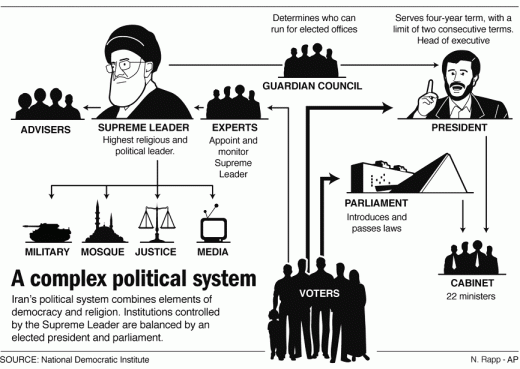
According to the information published on the website, Khamenei wakes up at 4 AM every morning for prayer. Between 6 and 7 AM he meets with senior officials from his office, and three times a week between 7 and 8 AM he meets with his influential son, Mojtaba. The rest of the leader’s day includes reading materials pertaining to security, politics, and economy, an afternoon rest, prayers, various meetings, and attending to his personal affairs. Khamenei goes to bed at 9 PM. Once a week the leader holds meetings with the president, with army and Revolutionary Guards commanders, and with members of the Guardian Council. Once a month the leader meets with the Majles speaker and with the judiciary chief.
The Supreme Leader’s interests include eating caviar (shipped especially for him by the Friday prayer leader in the city of Rasht in northern Iran), physical exercise (mountain climbing and horseback riding), and social meetings with the cleric Rashed-Yazdi, known for his habit of telling dirty jokes. In addition, Khamenei is highly interested in poetry, composing his own poems from time to time.
Khamenei has several impressive collections, including a pipe collection (about 200 pipes worth 2 million dollars), a ring collection (about 300 rings, the most expensive of which is worth about 500 thousand dollars), and a collection of robes (about 120 robes with a total worth of about 400 thousand dollars).
The Supreme Leader is married to 67-year old Khojasteh. One of her brothers was a member of the Mojahedin-e Khalq opposition organization who fled to Sweden; her other brother, Hassan, holds a monopoly on purchasing Sony cameras and television sets in Iran.
Khamenei’s personal guard includes 200 people, while his extended security team has about 10,000 (about 1,000 of them women). Out of his security guards, 500 are in charge of securing the leader’s close family, which includes about 40 people.
Khamenei’s personal physician is Ali-Reza Marandi, Iran’s former minister of health, who is in charge of a team of physicians who provide the leader with medical services as required. Khamenei’s basement houses a private hospital staffed at all times by four on-call physicians. During his trips, the leader is always accompanied by a mobile hospital. Khamenei has undergone surgery three times during the past 30 years: a hand surgery after he was injured in a terrorist attack carried out by the Mojahedin-e Khalq in the Islamic Republican Party headquarters in June 1981, a duodenum surgery, and a prostate surgery. Khamenei has been suffering from clinical depression for years. He often receives a massage from a physiotherapist.
The Supreme Leader travels across Iran for about 100 days per year. He spends his vacations (one month in the summer, one week during the Iranian New Year break, and one more week in the winter) in the palace of Vakilabad in the city of Mashhad, on the Dezful air force base in Khuzestan (south-western Iran), or by the Caspian Sea in northern Iran.
Khamenei and his family have at their disposal one Airbus, two Boeing-707 airplanes, five Falcon airplanes, five helicopters, 17 armored limousines, and 1200 other vehicles.
Khamenei is also involved in various private business enterprises, which include exporting sugar, rice, and BMWs, manufacturing sugar and sugarcane, as well as investments in Dubai, Germany, Iraq, South Africa, Venezuela, Lebanon, and China. His main business activities, however, have to do with oil and natural gas, and the acquisition of arms from Russia and China. His personal fortune is estimated at 30 billion dollars, and that of his family is estimated at another 6 billion. Following the political crisis which broke out after the last presidential elections in Iran, the leader attempted to smuggle a considerable portion of his funds to Syria; however, the money was confiscated in Turkey and the government of Iran is attempting to get it back. Most of the money is kept in Iran, with large sums also held in banks in Russia, Syria, China, Venezuela, South Africa, Britain, and other countries.
Khamenei has four sons and two daughters. His second son, the one who is most involved in and has the greatest influence on politics, is Mojtaba (41). Khamenei’s other children are Mostafa (his eldest son), Mas’ud, Meysam, and his daughters Beshri and Hoda.
You can read a full translation here.
Mazzeltov,
Crethi Plethi



 RSS
RSS

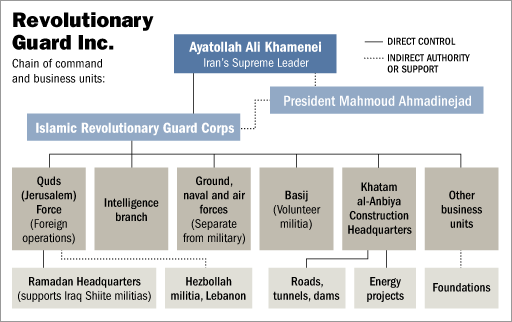
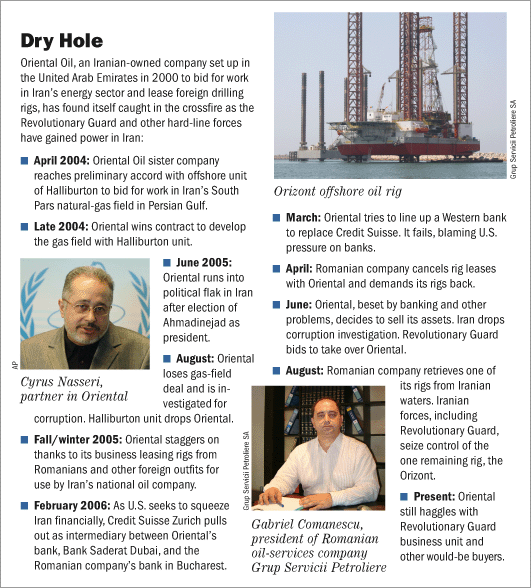
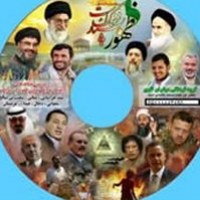

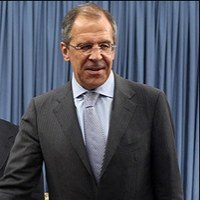
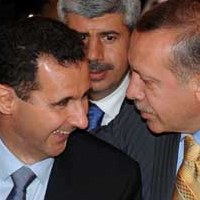
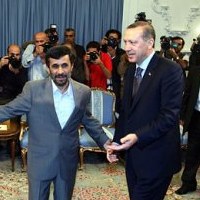




How the Revolutionary Guard is involved in Iran's economy #iran #islam #revolution http://j.mp/d84MHI
[…] Revolutionary Guard Inc. […]
[…] Revolutionary Guard Inc. […]
RT @CrethiPlethi: How the Revolutionary Guard is involved in Iran's economy #iran #islam #revolution http://j.mp/d84MHI
[…] of State Hillary Clinton said the government of Tehran was being “supplanted” by the Iranian Revolutionary Guards Corps, and was in danger of becoming a “military […]
[…] https://www.crethiplethi.com/revolutionary-guard-inc/islamic-countries/iran-islamic-countries/2010/ ============ أنصاره في طهران ومدن إيرانية أخرى. […]